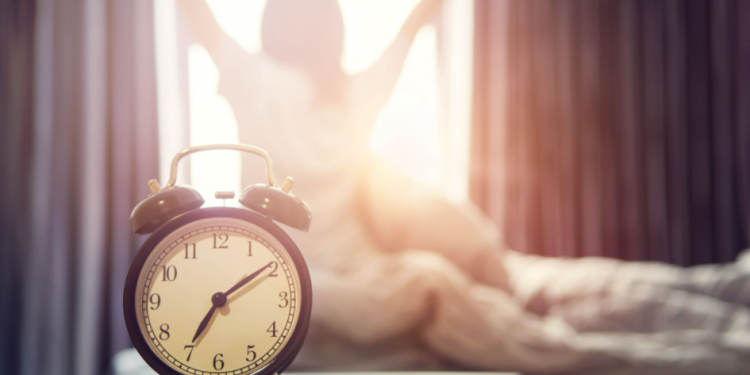by Stephanie Moon, MS, OTRL, CBIS
Sleep is the foundation for everything we do. It gives us energy, creates routine, and provides our brains and bodies with time to heal. I’m not here to argue the importance of sleep. If you’re reading this, you may already know why you need to sleep—it’s the how part. Do you sleep too much? Do you sleep too little? If you’re looking to improve your sleep habits, there are three main things to consider: your daytime habits, your bedtime habits, and your sleep environment.
Daytime Habits
Sleep isn’t just about what you do before you go to bed. Structuring your day can have a big impact on how well you sleep at night.
- Spend time outside and/or in the sunshine when possible. Ensuring that daytime actually looks like daytime helps create a natural routine for your body’s sleep-wake cycle to follow.
- Exercise regularly (but not within four hours of bedtime). If you don’t have an exercise routine, start small, and then build up over time. Even 5-10 minutes can make a difference. My favorite way to exercise every morning is to dance around the house while listening to music before anyone else wakes up. Find what motivates you!
- Wake up at the same time every day and go to bed at the same time every day. Human bodies crave routine.
- Decrease the amount of time spent sleeping during the day. If you do nap (yes, I nap too), set a timer to ensure you don’t sleep for more than 20-30 minutes. It takes time to learn the skill of “power napping.” but it is a valuable tool.
- Limit the amount of liquids you drink before bed — but only if the thing that’s keeping you up at night is frequent trips to the bathroom. Going to the bathroom “just in case” before bed can be detrimental to bladder health over time.
- Avoid caffeine after lunch. Sources of caffeine include: coffee, tea, soda, and (unfortunately) chocolate.
- Do not smoke, especially before bedtime. The nicotine found in cigarettes acts as a stimulant.
- Do not eat food within two hours of bedtime. It can be more difficult to sleep with a full stomach.
Bedtime Habits
What do you usually do to get ready for bed each evening?
- Follow a relaxing bedtime routine. Some suggestions include: taking a warm bath, listening to relaxing music, or completing gentle stretches.
- Avoid stress before bed. Harder than it sounds, right? Try to set healthy boundaries by avoiding stressful activities before bed. Instead, set aside time during the day for tasks like paying bills, studying, etc. when possible.
- Do not take your worries to bed. Another one that sounds easier than it is. Consider writing your worries down in a notebook or make a to-do list of what you need to accomplish tomorrow, and then give yourself the night to rest. Sometimes putting your thoughts down on paper helps get them out of your head.
- …But I’m still not asleep! If you’ve been lying in bed for 30 minutes or more, get out of bed and do a relaxing activity. Find an enjoyable podcast or listen to music. Afterwards, go back to bed and try to sleep again. The goal is to retrain your brain that bed = sleep.
Sleep Environment
Consider how your bedroom is set up while reviewing these tips:
- Avoid bright lights before bed and block out extra noise. Similar to how your body should be experiencing a sunny daytime environment each day, your body should also experience a darker and quieter environment at night to promote a healthy sleep-wake cycle. It is ok to sleep with ambient background noise (such as a fan) to block out more disruptive sounds.
- Avoid screen time before bed and while in bed. This includes tablets, cell phones, and television, as all of these are stimulating to both your eyes and your brain. If you have a television in your bedroom, considering removing the temptation.
- Reserve the bed for sleep and intimacy. Train your brain to remember that your bed is a restful place, and set aside another part of your home to do work.
- Keep the room you sleep in at a cool, comfortable temperature. If it’s summer, this may mean opening a window or paying a little extra to turn on the air conditioner overnight.
Additional Steps
Be sure to write down which strategies you’ve tried and their level of effectiveness. If you’ve tried using all these sleep strategies for two to three weeks and are still not getting enough quality sleep each night, consider asking your physician for a referral to a sleep specialist. Sleep specialists can rule out other health problems and offer even more recommendations.
Stephanie Moon is an Occupational Therapist and Certified Brain Injury Specialist at Origami Rehabilitation in Mason, MI. Origami is a 501(c)(3) nonprofit organization. Origami provides comprehensive rehabilitation for children, adolescents, and adults with neurological, developmental, mental health, and orthopedic conditions through their residential and outpatient programs. With their compassionate and innovative services, Origami creates opportunities and transforms lives. Learn more about Origami’s programs and services online at www.origamirehab.org.











